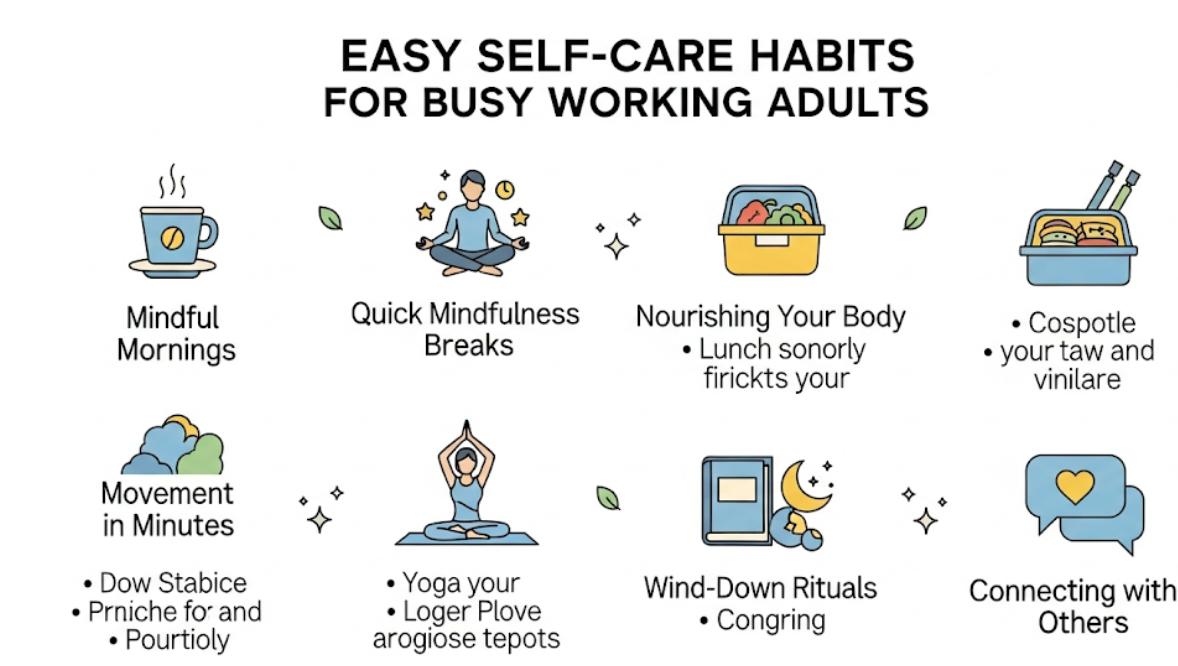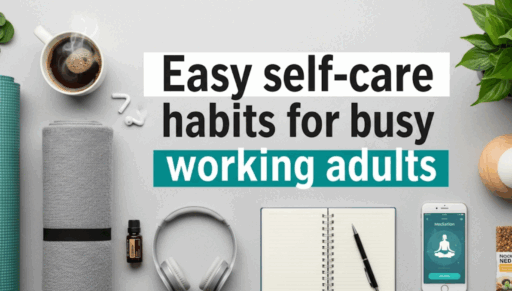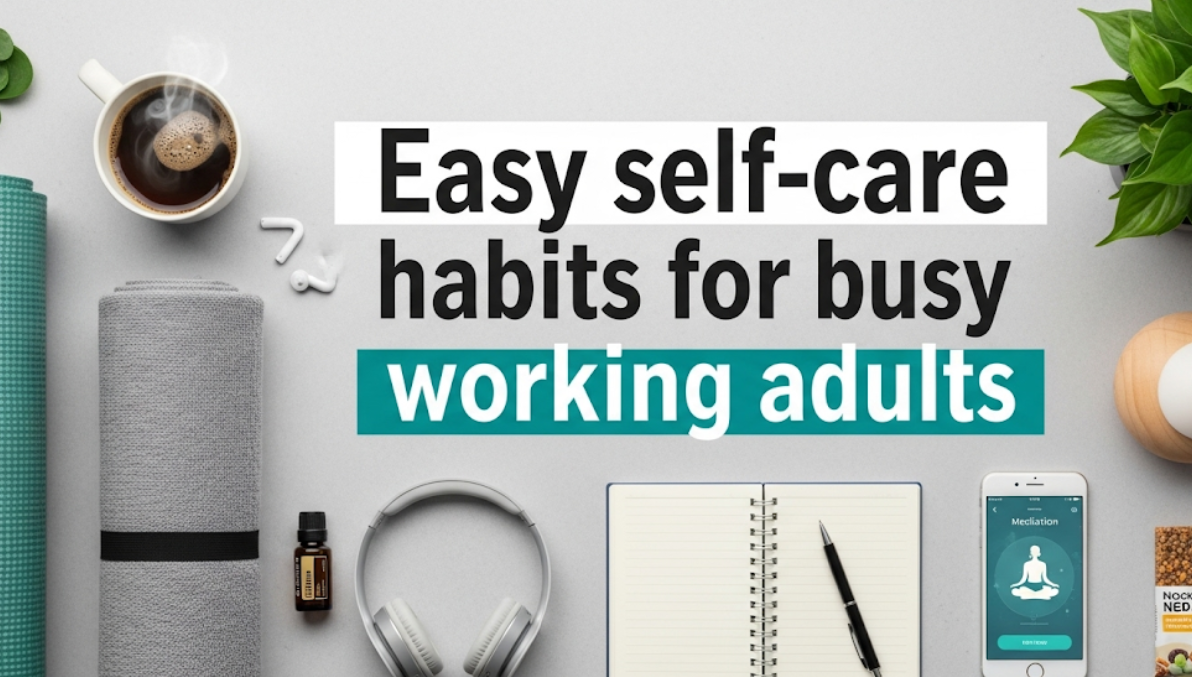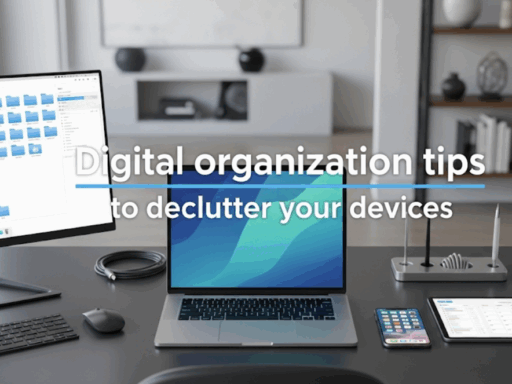Simple Self-Care Practices for the Fast-paced Working Adult: How to Achieve Wellness without all of the Fuss
Modern life moves fast. Juggling work, family and friends, it seems — at times — as though you never have a spare moment for yourself. However, self-care is no longer a luxury — it’s crucial for your mental and physical well-being as well as productivity. The good news? Taking better care of yourself doesn’t need to take hours of free time or expensive spa treatments.
This handy guide shows you how to seamlessly incorporate self-care into your busy daily routine. When time is tight, use these tips if you only have five minutes to spare or extend them to 50 minutes more to allow your space and reduced pressure while still focusing on your health.
Self-Care in Action: For the Working Professional
Saying yes to self-care is like saying yes to being able to show up for the work that you love, relationships that are important, and your general enjoyment in life. You put yourself at risk of:
- Burnout and chronic stress that lower your value
- Physical illness: headaches, digestive problems, low immunity
- Anxiety, depression and mood swings
- Irritability and emotional exhaustion leading to strain on relationships
- Lesser productivity and troubles in concentration at work
When you are able to care of yourself regularly, it leads into a positive cycle: The better you take care of yourself the more energy and clarity you will have and more resilience, meaning that you can tackle life’s daily events.
What to Do When You Have No Time In The Morning
To start your day with purpose leads to a much more manageable outcome. These morning practices require five minutes every day or less to fully cultivate a ritual with pronounced impacts.
The 5-Minute Morning Reset
Change your mornings with this easy routine:
- 10 deep breaths before leaving the bed
- Have a full glass of water to restore your body with some fluid
- Write down three things you are grateful for in a little notebook
- Stretch for 30 seconds — activating the muscles
- Focus on a single positive intention for the day ahead
Mindful Morning Habits
- Do not check your phone in the first 30 minutes of waking
- Listen to mellow music when you wake up instead of the dreadful news
- Make your breakfast extra special by feeling the colors, textures and tastes
- Give yourself five minutes to sit quietly with coffee or tea
Power-Up Breakfast Strategies
- Overnight oats with berries – 5 minutes to prep (made the night before)
- Greek yogurt with nuts and fruit – 2 minutes to grab and go
- Banana + almond butter – under 1 minute if time crunched
- Hard-boiled eggs – batch prepped for zero time spent on breakfast; just grab from fridge
11 Micro Self-Care Moments During Your Work Day
Self-care at work through short breaks helps keep you grounded and on top of your hectic day.
Desk-Based Wellness Breaks
Every 2 Hours:
- 10 shoulder rolls back
- Look away from your screen and gaze at something 20ft away for 20 seconds
- Take 5 deep belly breaths
- Gently move your neck side to side
Hourly Hydration Check:
- Have a water bottle on your desk
- Use phone alerts to remind you about water
- Add variety: use lemon or cucumber
- Aim for 8 ounces every hour
Stress-Busting Techniques for Busy Moments
In those moments where the deadlines are coming up and the pressure is building, these fast stress relievers can help:
The 4-7-8 Breathing Method:
- Inhale for 4 counts
- Hold your breath for 7 counts
- Exhale for 8 counts
- Repeat 3-4 times
Progressive Muscle Relaxation (2-minute version):
- Hold your shoulders tight for 5 seconds, then relax
- Hold a tight fist for 5 seconds, and let go
- Squeeze your facial muscles for 5 seconds and then let go
- Notice the tension and relaxation
Healthy Workplace Snacking
Stock up with these nutrient dense options at your desk:
- Unsalted raw nuts and seeds: Cashews, sunflower seeds, pumpkin seeds – Good to have on long days for some sustained energy
- Sliced apple with individual nut butter packet for protein and fiber
- Relaxing herbal tea bags
- Antioxidant-rich dark chocolate squares
How to Squeeze in a Little Lunch Break Self-Care
Aside from the toilet break, lunch is your one precious moment to reset and recharge. Get the most out of this period by using these adaptable tips.
The 15-Minute Power Lunch
Option 1: Outdoor Reset
- Eat lunch outside or by a window
- Walk for 5 minutes even if it is around the building
- Sit down and actually eat without working or scrolling through your phone
- Express gratitude for your meal and wherever you are
Option 2: Indoor Recharge
- Find a quiet spot that is not your workspace
- Do a guided meditation for 10 minutes
- Write in your journal for 5 to 10 minutes about what happened in the morning
- Stretch your back, neck and thighs
Meal Prep Magic For Those Busier Than Busy
These easy meal prep strategies will save you time, get you better meals and can help you eat healthier.
Sunday Prep Session (30 minutes):
- Prep veggies for a week of healthy meals
- Cook some quinoa or brown rice — one batch at a time
- Prepare 3-4 mason jar salads
- Hard-boil a dozen eggs
Grab-and-Go Lunch Ideas:
- Mason jar salads with the dressing first
- Hummus whole grain wraps with vegetables
- Leftover dinner portions in containers
- Greek yogurt parfaits with granola and fresh fruit
Get to Sleep More Quickly with Evening Wind-Down Routines
Sleep is the foundation of everything healthy, yet our busy schedules take us away from getting rest. Develop a bedtime ritual to help your body understand it’s time to rest.
The Digital Sunset Approach
1 Hour Before Bed:
- Stop work equipment and do not follow up on any work-related material
- Let your living space dim
- Change to less stimulating activities such as reading or light stretching
- Steer clear of intense TV shows or heavy conversations
Quick Evening Self-Care Rituals
10-Minute Wind-Down:
- Skincare (2 minutes): Cleanse, rinse, moisturize
- Easy stretching (3 minutes) — Neck, shoulders, and back
- Gratitude (2 minutes): Consider all the good things that happened throughout your day
- Deep breathwork (3 minutes) — Practice 4-7-8 breathing
20-Minute Extended Version:
- 10 minute hot bath or shower
- Light reading/journaling (5 mins)
- 5 minutes progressive muscle relaxation
Sleep Environment Optimization
Turn your bedroom into a cozy sleep sanctuary:
- Keep temperatures between 65 and 68°F
- Block the light: Sleep in a dark room, use blackout curtains or an eye mask
- No screens in the bedroom or use a blue light filter on your device
- Use lavender oil aromatherapy or drink chamomile tea
A Weekend of Relaxation & Self-Care That Feels Like It!
Weekends are a more relaxed time for self-care, but we should not turn them into the source of pressure. Prioritize time for activities that offer you true restoration and energy.
Active Recovery Options
Low-Impact Activities:
- Local nature walks or around your neighborhood
- Gentle yoga or stretching sessions
- Swimming at a community pool
- Bike rides on easy trails
Social Self-Care:
- Coffee dates with supportive friends
- Game nights or movie marathons with the family
- Volunteer for a cause you care about
- Walking groups or workout classes
Home-Based Wellness Activities
Turn your living area into a private relaxation zone:
Create a Reading Nook:
- Find a comfortable chair with good lighting
- Have a soft blanket and pillow close by
- Stock books, magazines, or audiobooks
- Include a small plant for atmosphere
DIY Spa Experiences:
- Kitchen mask (honey, oatmeal and avocado)
- Epsom salt bath with essential oils
- Roll out tension with a tennis ball
- At-home manicure or pedicure
Self-Care that Stays: Making It Sustainable
Permanent change is a strategic endeavor. Stick with these proven tips for maintaining a regular self-care routine.
The Habit Stacking Method
Tie new self-care routines to established habits:
- “After I make my morning coffee, I’m going to write down one thing I am grateful for”
- “When I sit at my desk, I will take 5 deep breaths”
- “When I get back from lunch I take a walk around the block”
- “Before I brush my teeth, I will do three light stretches”
Start Ridiculously Small
Start with habits too simple to fail at:
- Week 1: One additional glass of water per day
- Week 2: One extra minute of deep breaths per day
- Week 3: A two minute walk after lunch every day
- Week 4: A moment of gratitude before bedtime every night
Track Your Progress Simply
Use these easy tracking methods:
| Method | What it’s best for | Example |
|---|---|---|
| Phone calendar | Scheduled activities | Mark “walked 10 minutes” |
| Habit tracking app | Daily consistency | Check off completed habits |
| Simple notebook | Reflection and growth | Write brief daily notes |
| Photo journal | Visual progress | Take pictures of healthy meals |
Self-Care, Not Just for People with Time or Money
Self-care looks different for everyone. Take these principles and mold them to your advantage and what you are capable of.
For the 60+ Hour Work Week
Micro-habits (2-5 minutes each):
- Keep your car and office stocked with healthy snacks
- Take the stairs, not elevator wherever possible
- Practice breathing exercises during commutes
- Listen to relaxation podcasts and audiobooks
- Take phone calls while walking wherever you can
For Parents Juggling Everything
Family-Friendly Self-Care:
- Walks with kids in strollers or bikes
- Yoga videos with kids playing nearby
- Make healthy snacks a family affair
- Bath time as meditation period
- Quiet time for children to read

Budget-Conscious Self-Care
Free or Low-Cost Options:
- YouTube yoga and meditation videos
- Library books and audio for relaxation
- Free community events & outdoor experiences
- Home spa treatments with items from around the house
- Safe neighborhoods for walking or jogging
Affordable Investments (under $20):
- Essential oils for aromatherapy
- Herbal teas for relaxation
- Journal or notebook for reflection
- Foam roller for muscle tension release
- Plants for optimizing indoor air quality
Managing Common Self-Care Obstacles
Barriers can foil the best of intentions. Be ready to face these challenges with practical solutions.
“I Don’t Have Time”
Real Talk: Track your screen time for a week and reroute just 10 minutes of that daily to some self-care.
Quick Solutions:
- Integrate self-care into things you already have to do (mindful eating, walking meetings)
- Use transition times (breathing practice while commuting)
- Prioritize morning self-care by getting up 10 minutes earlier
- Set up micro-practices during commercial breaks or waiting periods
“I Feel Guilty Taking Time for Myself”
Mindset Shift: Your self-care isn’t selfish — it’s basic maintenance to help you show up better for others.
Practical Approaches:
- Start with health-related activities (hydrate, eat well)
- Get family and friends involved in self-care
- Remember that when you model self-care, it teaches others to take better care of themselves
- Frame it as self-maintenance that helps you maintain your ability to help others
“I Forget or Backtrack too Much”
Systematic Solutions:
- Schedule self-care tasks in your calendar
- Leave visual reminders in plain sight (water bottle on desk, sneakers by the door)
- Find an accountability partner or online communities
- Celebrate small victories to keep you going
- Make adjustments instead of completely abandoning habits that aren’t working
Self-Care Tech Tools
Use technology to make self-care easier and more consistent, remembering that the simplest methods are usually the best for sustainability.
Helpful Apps and Resources
Meditation and Mindfulness:
- Headspace: Best for guided meditation
- Calm: Great for meditation and sleep stories
- Insight Timer: Free meditation app
Physical Activity:
- 7-Minute Workout: Quick bodyweight exercises
- Nike Training Club: Free workout videos
- Strava: GPS for running and walking
Sleep and Relaxation:
- Sleep Cycle: Track and improve sleep habits
- f.lux: Reduce blue light exposure on devices
- White Noise apps: Create calming atmospheres
Creating Boundaries with Technology
Healthy Tech Habits:
- Activate “Do Not Disturb” during meals and sleep times
- Set aside screen-free areas in your house
- Schedule specific times for emails and social media
- Choose educational or calming content instead of news
Your Personal Self-Care Action Plan
Self-care isn’t one-size-fits-all. Develop a plan that adapts to your lifestyle and preferences.
Weekly Self-Care Planning
- Monday: Set intentions & prep healthy snacks
- Tuesday: Focus on water consumption and movement breaks
- Wednesday: Practice mindful eating
- Thursday: Connect with supportive people
- Friday: Celebrate small victories and plan weekend activities
- Saturday: Enjoy unstructured self-care activities
- Sunday: Prepare for the week ahead
Monthly Self-Care Assessment
Ask yourself these questions every month:
- What self-care practices am I doing regularly?
- What obstacles am I facing most often?
- What activities leave me feeling energized and peaceful?
- What could I change to make self-care more appealing and accessible?
- How has regular self-care influenced my work, relationships and overall health?
Seasonal Self-Care Adjustments
Modify your self-care routines as the seasons change:
- Spring: Focus on renewal with outdoor activities and fresh foods
- Summer: Plan for extra hydration, sun protection, and social connections
- Fall: Prepare for busy seasons with meal prep and new indoor hobbies
- Winter: Prioritize warmth, light exposure, and immune health
5 Signs Your Self-Care is Actually Working
- Stronger resilience during high-stress times
- Physical relief from headaches or stomach upset
- Better sleep quality and waking up refreshed
- Improved patience and presence in relationships
- Increased focus and energy for work productivity
- Anticipation rather than viewing self-care habits as a chore
Expanding Your Self-Care Toolkit
As your basic self-care habits become more routine, you can slowly integrate new elements:
- Try new forms of exercise
- Explore different meditation or relaxation techniques
- Engage in creative hobbies that you enjoy
- Learn about nutrition and cooking for sustained energy
- Build stronger relationships and social connections
Remember: self-care is a regular part of your life, not just some place to visit. There will be days when it feels easier than others, and that’s okay. Return to your healthy habits without getting down on yourself, and keep creating a lifestyle that nourishes all of you.
Your health and happiness matter. Use these easy, doable self-care tips to invest in yourself and your ability to thrive instead of just survive! Take baby steps, stay consistent, and soon you will feel the difference in your everyday life.
Better self-care starts with one simple step. Select one habit from this guide and stick with it for just one week. Starting today, your future self will thank you.




